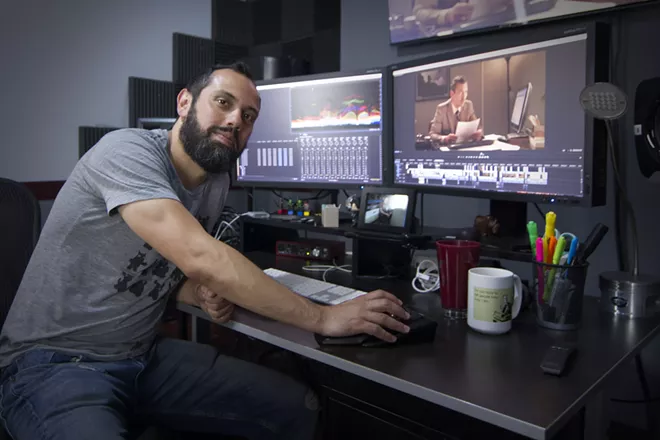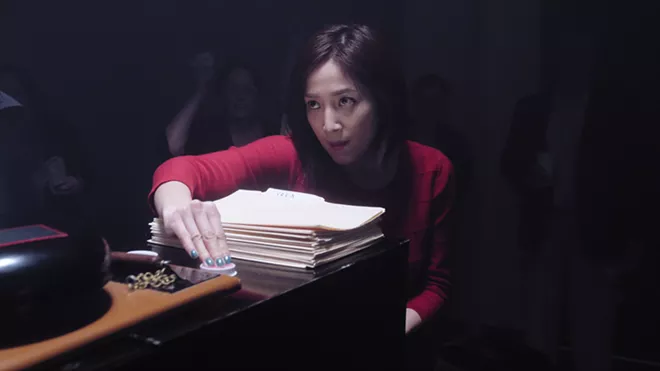
Photo by Aaron Bennett
Director/writer/editor Rick Castañeda mans the edit bay while putting together All Sorts.
The doldrums of office life certainly isn't untrodden comedic ground. Shows like The Office and films like Office Space have become cultural touchstones for mocking the monotony of cubicle life while dwelling on the relationship bonds that can be formed during those 9-to-5s.
All Sorts takes the office setting and turns the fantastical absurdist dial all the way up. From the mind of Rick Castañeda (a native of Granger in Central Washington), the film follows Diego (Eli Vargas) who takes a job in a data center only to find his workplace to be incredibly odd. He's not given a computer, boss is brash eccentric idiot, file cabinets eat people, his tear-off calendar boasts unreal dates, and something seems to be living in the walls. On the plus side for Diego, he stumbles across June (Greena Park) a frenetic filing wiz and perfect office crush material. Their worlds become intertwined when Diego discovers the underground world of competitive filing and gets June to enter with her speedy skills.
Is that zany enough for you? It's not an exaggeration to All Sorts may be the quirkiest movie I've ever seen — it is wall-to-wall unrelenting quirk.
Shot in Yakima in 2018, All Sorts went on to premiere at the Seattle International Film Festival in 2021. Since COVID times have been extra rough on smaller indie films, All Sorts hasn't had the smoothest rollout, but it's finally arriving in Spokane. The film will screen at the Magic Lantern Theatre for a week starting this Friday, May 20. The Friday night screening will feature a red carpet premiere and Castañeda will be on hand to do a post-screening Q&A.
In anticipation of All Sorts arriving in Spokane, we caught up with Castañeda to chat about growing up in Granger, Eastern Washington's enthusiasm for moviemaking, and how soul-draining temp work can lead to an a comedic film.
What are the various seeds of ideas that kind of you threw on the ground, let cross-pollinate, and eventually became All Sorts?
So I'm originally from Granger, Washington, and I came to L.A. for film school. That was a big step, choosing to actually go after what I really wanted to be doing, as opposed to doing something more safe and trying to do film on nights and weekends. I decided this is exactly what I wanted to be doing, and I'm gonna go after it.
And I found myself in 2003 with a degree in film, and not a real clue about how to get a job in film. I started applying a bunch of places, but I just couldn't find anything whatsoever, I was getting turned down for courier positions. And so, in order to make rent, I did a lot of office jobs.
I signed up for an office temp agency, and they sent me out to these different places. They're like all cubicles, many of them have no windows, and you're kind of in this dank place with a lot of people where nobody really wants to talk out loud because they're all kind of afraid of getting in trouble for not working. It's just a very odd, eerie place. I became very depressed. I thought, I'm not going to be able to get to where I wanted to go. Maybe this is what the real world is like, what people [mean when they] talk about how depressing it is. All your dreams come crashing to the floor.
And so I started writing a lot of stories during that time. And I found that I was basically writing a whole bunch of different stories where I put magic into that office cubicle space. One of those stories was about a woman who filed really fast because I thought that that would be really funny, because one of my jobs was filing folders. And I thought, “If somebody was just amazing at this what what would that be like? What would it be? What if instead of like an underground dogfighting competition or underground boxing match if it was like a filing competition?” And there are lots of other people who inspired me. I had bosses who thought that they were the king of the Earth even though it was just like a really tiny office that they were in charge of. One of the things that I was really worried about was losing myself in the office. And so I wrote one character who builds himself into a cubicle in order to, like, kind of escape it. And that character finds his way into the movie as well.
It's really odd that this movie about offices came out at a time when everybody's working from home. So even though I kind of made it about how strange it was to work in an office, it's now become almost nostalgic.
There are so many different quirky ideas happening concurrently in All Sorts. How did you approach trying to juggle all those bits and still make the movie feel coherent?
When I started writing this film, I was writing it as a series of vignettes. And I was looking to other movies that were made of vignettes like Short Cuts and M*A*S*H. And I found that the ones that I really liked all had vignettes that revolved around a theme. And, for us, that theme was the office.
But I wanted to make a through line of this romance at the center of it — between Diego and June. And that kind of was the anchor of the film. We did a lot of experimenting with the film, showing it in different various kinds of edits to make sure that it was working. And it’s a very difficult alchemy because on one hand, you have these like very interesting vignettes — like the guy in the office who gets phone calls from someone who thinks he's cheating with his girlfriend — and then you're trying to balance that with the love story at the center of it. And if you kind of weighted it too far one way, people were like, “Why are there still weird other characters that have nothing to do with the main part?” And then if you weighted it too far [the other way], then it just becomes a love story that doesn't have all the interesting bits that I really wanted to put into it.
And so we kind of use the love story to make it feel true and real in a way that the whimsical elements do not. The other thing that we did was try to rope those [whimsical elements] back into the main story at the end.
I think one thing to definitely get straight is this movie is ridiculous. It just has ridiculous thing upon ridiculous thing.
Why have you come back to Central Washington to shoot your films?
In L.A., when you make a film, it's very difficult. There're lots and lots of permits, because the area's inundated with filmmaking. It's very easy for people to work on everybody's films, and they get uninspired. Filmmaking here [in L.A.] is not new and interesting, it's the grind, it’s the daily business.
Whereas I found that making a film in Eastern Washington is exciting to everybody. For instance, when I was making a short film when I was in high school, I was able to get the chief of police to be in my short film. And so, obviously, that's not something that you can do in Los Angeles. I can't get the LAPD to be part of my film. We found that there's just so much support in Eastern Washington. And I think it's because when I lived there, you know, I was looking for lots of creative things to do, and there aren't a lot of creative opportunities in that area. And so when we brought this movie, it became that creative opportunity for everybody to be a part of it. We decided to make this movie in Eastern Washington, because we wanted it to be very different from from a Hollywood film. We wanted it to be different and new and fun.

Courtesy Vibrant Penguin
For all its quirk, the relationship between Diego (Eli Vargas) and June (Greena Park) forms the core of All Sorts.
How did growing up in Granger shape your creativity?
In some ways, I really think that's where my creativity started. I grew up out in the country on a small little three-acre farm. And so there weren't a lot of kids my age that I could play with. So I just created stories and things on my own. I would kind of go into my own head and imagine that I was on a spaceship or that was part of some sort of Lord of the Rings trilogy in my backyard.
But then I found a lot of friends who really loved movies. And we found a VHS camera and were out filming on our own. Really when we first got a Mac computer at my school — this was probably like 1999 — that really let me have the [ability] to make very specific changes in the film. As opposed to VHS, which is a very blunt instrument: it's very hard to pause and record and edit on those. Being able to add my own titles and sound effects, I was just able to run wild. And that was was the moment where I knew, “Okay, this has to be what we do.”
Is there anything else you’d like to add about the All Sorts screening at the Magic Lantern?
I know that Spokane has way more arts than Granger does, but there still aren’t a lot of opportunities to come and see the filmmakers behind a film. And I think that if you have an interest in film, it's so great to be able to come out and ask the filmmaker the questions that you want to ask about how this film got made.
One of the hardest things I think about being an artist or filmmaker is just like being able to stick with one idea for four or five years, and keep coming back to it even though you have other ideas about other things. And that's one of the things I'm going to be talking about in the Q&A. Just like how believing is like the first step of any endeavor, that you just have to believe in it to in order to get other people to believe in it. And I think that that's one of the messages of All Sorts too. Believe in yourself.
All Sorts • May 20-25 at 7 pm • $10-$11 • Magic Lantern Theatre • 25 W. Main Ave. • magiclanternonmain.com • 509-209-2383

